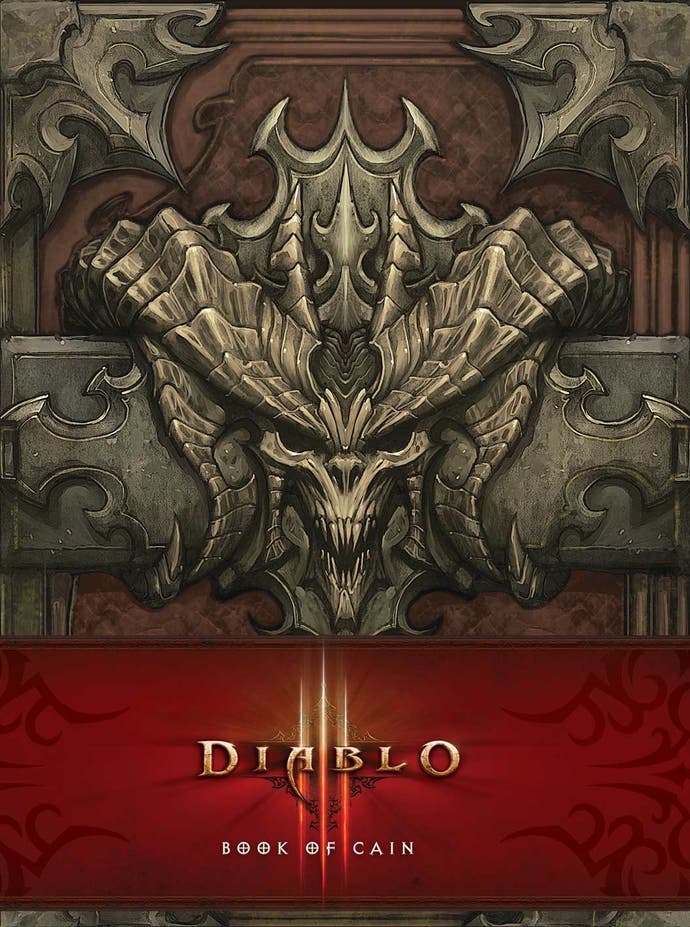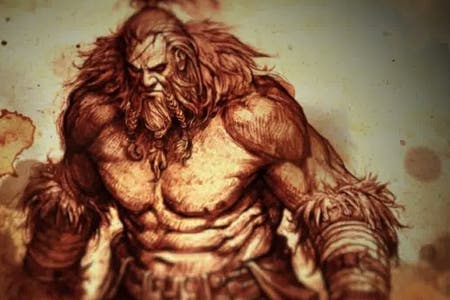The Mythology of Diablo
Chris Metzen talks about tie-in The Book of Cain - and the origins of Blizzard's darkest world.
Diablo 3 has been a long, long time coming.
After at least four years in development, it'll finally see release on May 15th and for fans of the series, it couldn't come too soon. Diablo 2 hit the shelves in 2000 and since Lord of Destruction, the expansion pack launched a year later, the franchise has lain dormant, producing nothing more than a few tie-in novels. That's 11 years of restless sleep, and it's 16 years since the original Diablo first sent gamers to the troubled town of Tristram. 16 years. Almost a generation away.
More than enough time for gamers to shake off the grim mantle of the series: a murky, Gothic tale of tragedy and corruption. For many others, the third Diablo will be their first experience of a universe that likes to end its episodes on a downer - either a terrible defeat or a crippling compromise.
The series sidesteps traditional fantasy and draws as much from the deepest, darkest parts of the Bible as it does any text by Tolkien. Diablo's world has endured an eternal struggle between heaven and hell, the mortal realm between them suffering corruption, possession and madness at the hands of demonic forces. Victory seems to manifest itself only as a reprieve, rather than any lasting success, and each of the games' heroes have had to battle tremendous odds to achieve this - sometimes only to be deceived.

On a sunny spring evening, talking to Blizzard's Chris Metzen over the telephone, all this darkness is a world away. It's his intention to pull me back into it with tie-in volume The Book of Cain, something that'll both introduce the world of Sanctuary to new gamers and refresh the memories of Diablo veterans. The book is a sombre encyclopaedia and retrospective of the series, presented as a historical document that has "escaped" the game world.
"The book of Cain is actually an object in Diablo 3," explains Metzen. "It comprises all of Cain's collected knowledge and we actually see it featured in a few of the cinematics." Cain, the wise and weary scholar of Diablo lore, uses the text to pass all his esoteric knowledge to his adopted daughter Leah - along with his hope for a better future. And for Blizzard, this is an ideal opportunity to expound upon a detailed world that has never really been fully explored in the games themselves.
"It's an attempt to codify the underlying mythology and history of the franchise," Metzen says. "The story of Diablo 3, the narrative and the world that you travel through, many of these things are very new. The ideas aren't new to the franchise, they go back as far as the first game manual - but they're a lot of ideas we haven't actually shown in the games so far. I wanted people to have as good a chance as possible to brush up, so that when they get their hands on Diablo 3, it's a much richer experience."
Metzen's official title at Blizzard is senior vice president, story and franchise development - but it may be simpler to think of him as head writer. Or perhaps "head writer of absolutely everything", as Metzen shapes the stories and characters behind all of Blizzard's titles. Though we're ostensibly talking about The Book of Cain, our interview wanders anywhere from StarCraft to Scooby Doo, and it's immediately apparent how passionate Metzen is about storytelling and world-building.
"Stories are the fundamental building block of human relationships!" he insists, and The Book of Cain is another chance for him to not only codify the world of Diablo, but to present its stories outside the context of a role-playing video game, beyond the realms of stats and graphics. "We wanted to be as authentic as we could and I think it definitely feels like a different kind of sourcebook. It's not about numbers, it's not about stats, it's about creating the illusion that this world exists somewhere - something you wouldn't get from just reading a comic book or novel."

The aim was to create a book that goes beyond what Metzen calls "data points", or bland, lifeless statistics, and felt more like a real-world document, so alongside its histories, pantheons and scribbled annotations by Cain, the book also begins and ends with Cain's personal letters to Leah, something Metzen says he fought hard to include:
"We could've constructed the book, with all its data points, and put this product out without Deckard Cain's letters at either end of the book because that's where the equity is; the equity is on the history and all these types of data. But I was desperate to get these letters in as bookends for the product because I wanted to bookend it with the emotion of [Cain speaking to Leah], explaining to her his fears of what he's seen and what may come, but even in the face of those fears, just how much he loves her and how much he's proud of her, and to try to encourage her to pick up this work and be her own woman.
"Now, that micro-story has nothing to do with the data points that comprise the book. But I want us as a company to really begin to look at opportunities to create really simple stories that everyone can relate to, so that sometimes it's not about mastering or getting lost in all the minutiae, but the simple points of human connectivity."
As we talk about the series' history, Metzen explains that the darkness of the Diablo world owes something to his own experiences and feelings when, "being the angry young man that I was," he helped create the series. "At the time, it made sense to me, this fictitious heaven-and-hell-destinies-of-man-eternal-conflict; it all just kind of spewed out, it seemed appropriate, given my own background. It just sang to me."
So this world is a reflection of who he was at the time? "I think that's always true with art," he says. "We always bleed a certain amount of our personal experience into the things we create, it's no different to any of my other work." Indeed, he told Oli something similar last year, including the caveat that he doesn't create entirely hopeless worlds, that there's "a threshold for the darkness."
"Diablo's always been very, very special to me," he continues. "I've always held that, apart from any specific story playing out in one of these games, the Diablo franchise has the most potential to really sing to people's hearts, because so much of it is mired in this struggle: good and evil, the clash of souls, the call to heroism. While many of those are found in our other franchises, none of them are so nakedly evident as they are in Diablo."
And there is another personal parallel in The Book of Cain. Many of those who have worked on Diablo 3 played the original game 16 years ago, growing from fans to people intimately involved with a world Metzen helped create. As Leah inherits both Cain's knowledge and his hopes for the future, is this a metaphor for what Blizzard's own senior developers want to pass on?
"We've grown over the years... We've attracted great young minds to come in and pick up these torches and carry on," Metzen says. "The simple fact is that time marches on and the studio and as well as us as individuals are maturing - you're entering different phases of life and so it does become important to pass on values, to pass on truths of the trade, to pass on things you've learned."
On allowing others to shape a world he created, Metzen is frank: "I can only speak for myself, but for a person like me it's beyond nerve-wracking, it's terrifying. It's literally your children, it's like some stranger coming in and taking your kids to the park, y'know? 'Get your hands of my kids, man!' But the trick is, how do you hedge against that? You don't bring in a stranger."
Instead, you find your Leah, someone you trust to share your work with. "You look for people who you think will be harmonic, who will share your core values," Metzen says. Sharing in this way, he adds, "is a hell of a thing. I didn't really learn do that in school, so it's been an interesting component of the last few years, but I see it bearing great fruit and this is a great example of that."
Will Diablo, StarCraft and Warcraft be around for the next 16 years? You wouldn't bet against it. They might even have stories to tell to our children. I wonder what clues lie in The Book of Cain and whether, this time, Diablo 3 will offer a better chance of salvation, a more positive conclusion to the ongoing conflict that plagues its world - or whether some new darkness will gather on May 15th.
You can view a preview of the first chapter of the Book of Cain on Blizzard's site.

